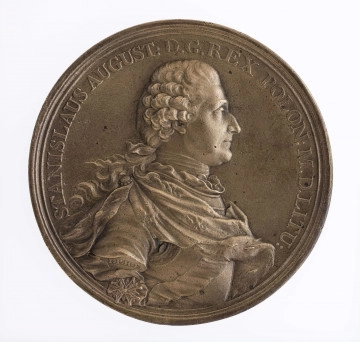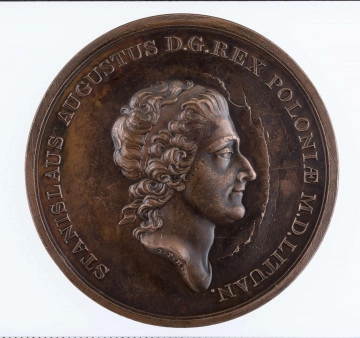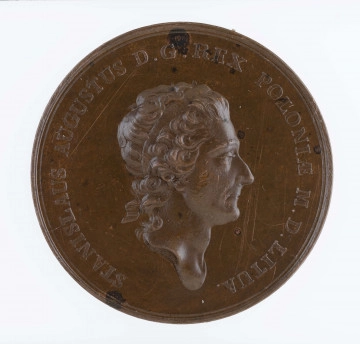
On the death of Stanisław August Poniatowski
National Museum in Lublin
Part of the collection: Polish medallic art.
The presented object is a copy of a medal from 1527. The cast was made in the middle of the 19th century. Unfortunately, the exact time and circumstances of its making are not known.
For a long time, Hans Schwarz, regarded as the first medal-maker working on the territory of the Habsburg monarchy, was considered the author of the original. Medallic art, known and valued in antiquity, was practically forgotten for centuries. It began to revive in Italy and Flanders only at the end of the 14th century. It gained popularity thanks to the Italian artist Antonio Pisano, also known as Pisanello, whose activity dates to the first half of the 15th century. He very quickly found followers in almost all of Europe. In Poland, the work of an unknown author from 1508, commissioned by Bishop of Wrocław Jan Turzon, should be considered the first medal in the proper sense of the word.
The medal in question, depicting King Sigismund I the Old, is also the work of an unknown artist. The date in the obverse inscription informs about the time of its creation. On the other hand, in the rim of the obverse, there is an inscription stating that the medal depicts Sigismund I, King of Poland and father of the country, whose image was made from nature at the age of 60. It seems that this is a faithful portrait of Sigismund I the Old. It is confirmed not only by the above-mentioned inscription, but also by the individual features of the portrait, in which it is difficult to see any excessive embellishment of the figure.
However, the reverse of the medal is not entirely faithful to the reality of 1527. In the central field, there is a shield with the coat of arms of the Kingdom of Poland, accompanied by three shields of arms of the lands related to Poland and the fourth one with the Habsburg coat of arms. The shield with the coats of arms of the Grand Duchy of Lithuania and Ruthenia is not questionable, while the territory of Ducal Prussia is symbolised by the coat of arms of the Teutonic Order. In 1527, it did not correspond with the current political situation. Two years earlier the order had been liquidated in the territory of Prussia, and the duchy started using a new, secular coat of arms, depicting a black eagle with a crown on its neck and the letter S on its chest. This letter was the initial of the name of Sigismund the Old (Sigismundus in Latin), but more importantly it symbolised the fief’s dependence of the duchy on Poland. It is also surprising that there is no coat of arms of Mazovia, which was incorporated into the Kingdom of Poland in 1526.
Leszek Poniewozik
Author / creator
Dimensions
cały obiekt: width: 79,5 mm
Object type
medal
Technique
silver-coating
Material
bronze
Creation time / dating
Creation / finding place
Owner
The National Museum in Lublin
Identification number
Location / status

National Museum in Lublin

National Museum in Lublin

National Museum in Lublin
DISCOVER this TOPIC
National Museum in Szczecin
DISCOVER this PATH
Educational path